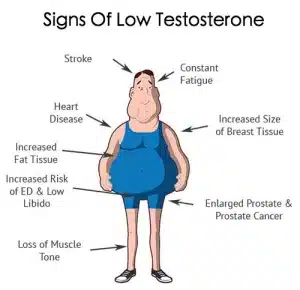
Low testosterone
Share
THE SYMPTOMS OF LOW TESTOSTERONE
Low testosterone, also known as hypogonadism, can lead to a range of physical and psychological symptoms in men. Some common effects of low testosterone include:
- Low libido: Testosterone is a key hormone in male sexual function, and low testosterone levels can result in a decreased sex drive.
- Erectile dysfunction: Testosterone also plays a role in the ability to achieve and maintain an erection.
- Fatigue and low energy levels: Low testosterone levels can cause fatigue and a general feeling of low energy.
- Decreased muscle mass and strength: Testosterone is important for muscle development and maintenance, and low levels can lead to a decrease in muscle mass and strength.
- Increased body fat: Low testosterone levels can contribute to an increase in body fat, particularly in the abdominal area.
- Decreased bone density: Testosterone is important for bone health, and low levels can lead to a decrease in bone density, increasing the risk of osteoporosis and fractures.
- Mood changes: Testosterone can affect mood, and low levels can lead to irritability, depression, and other mood changes.
- Memory and cognitive issues: Testosterone is important for cognitive function, and low levels can lead to memory issues, poor concentration, and other cognitive problems.
If you are experiencing any of these symptoms, it is important to consult with a healthcare professional who can help determine the cause and recommend the appropriate treatment, which may include testosterone replacement therapy.
TESTING YOUR TESTOSTERONE

A testosterone test is a blood test that measures the level of testosterone in your body. Testosterone is a male sex hormone that is also present in females in smaller amounts. A doctor usually orders the test if you are experiencing symptoms that could be related to low testosterone levels, such as decreased sex drive, erectile dysfunction, fatigue, or depression.
To get a testosterone test, you should make an appointment with your doctor or a healthcare provider. They will take a blood sample from your arm and send it to a laboratory for analysis. You may need to fast for a certain amount of time before the test, or avoid certain medications that could affect the results.
It’s important to talk to your doctor about the results of your testosterone test, as they can help you understand what they mean for your health and recommend any necessary treatments.
HOW TO INCREASE TESTOSTERONE
There are several natural ways to increase testosterone levels in the body:
- Exercise regularly: Regular exercise, especially resistance training and high-intensity interval training (HIIT), can help boost testosterone levels.
- Get enough sleep: Lack of sleep can lead to a decrease in testosterone levels, so it is important to get enough quality sleep each night.
- Maintain a healthy weight: Excess body fat can lead to hormonal imbalances, including decreased levels of testosterone. Maintaining a healthy weight through diet and exercise can help increase testosterone levels.
- Reduce stress: Chronic stress can lead to hormonal imbalances, including decreased levels of testosterone. Engage in stress-reducing activities such as meditation, yoga, or deep breathing exercises.
- Increase vitamin D intake: Vitamin D is essential for the production of testosterone, so it is important to ensure adequate intake through sunlight exposure or supplements.
- Consume a healthy diet: A diet high in protein, healthy fats, and fruits and vegetables can help support testosterone production.
Consider testosterone replacement therapy: In some cases, testosterone replacement therapy may be recommended by a healthcare professional to treat low testosterone levels.








